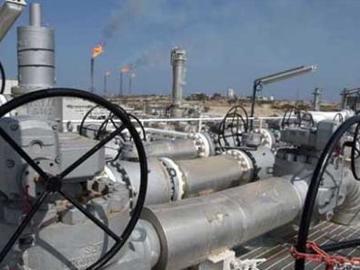
Turkmen President Supports Trans-Caspian Pipeline in Meeting With Top EU Officials
Publication: Eurasia Daily Monitor Volume: 8 Issue: 14
By:

On January 14-15, European Commission President, Jose Manuel Barroso, and EU Energy Commissioner, Guenther Oettinger, paid an unprecedented joint visit to Turkmenistan. They arrived directly from Azerbaijan, whose President Ilham Aliyev approved that country’s accession to the EU-planned Southern Gas Corridor on January 13 (EDM, January 19). In Ashgabat, President Gurbanguly Berdimuhamedov confirmed his support for the delivery of Turkmen gas across the Caspian Sea to Azerbaijan and onward through the Southern Corridor to Europe.
Prior to the visit, a Turkmen government meeting chaired by Berdimuhamedov had announced Turkmenistan’s readiness to export gas to Europe, citing the President to that effect (Turkmen Foreign Affairs Ministry press release, January 10). Specifically, Berdimuhamedov endorsed a trans-Caspian seabed pipeline as “the most attractive option from the commercial, financial, and infrastructure points of view” (Interfax, www.turkmenistan.gov, January 10, 15).
In the discussion with Barroso and Oettinger, the Turkmen president reaffirmed that trans-Caspian pipelines can be built with the consent of only those countries whose seabed sectors would be traversed by such pipelines. The EU similarly maintains that any two Caspian countries “have a full right to build a trans-Caspian pipeline between them,” and Barroso assured Berdimuhamedov of the “EU’s full political support for such a pipeline” (Turkmen State News Service, January 15).
Ashgabat also considers the possibility of delivering compressed natural gas (CNG) for shipment by tankers to Azerbaijan, decompression there, and onward transportation through the Southern Corridor to Europe. This option was also discussed with the visiting EU officials. But Berdimuhamedov implied during the joint press conference that this solution would be sub-optimal, necessitating as it would the construction of a fleet of tankers in the Caspian Sea.
Azerbaijan had all along been the leading promoter of the view that Caspian countries can legally build shore-to-shore pipelines on a bilateral basis. Russia and Iran claim that any trans-Caspian pipeline projects require the consent of all riparian countries, implying a veto. Speculation that Russia could enforce such a veto has tended to discourage trans-Caspian pipeline projects during the past decade. The CNG option would hardly have been seriously considered, were it not for Russian opposition to pipelines. To soften that opposition and facilitate a trans-Caspian pipeline project, Berdimuhamedov suggested to Barroso and Oettinger that Russian companies should be included, alongside Western ones, in a tender and consortium for such a project (www.turkmenistan.gov, January 15; Interfax, January 18).
The visiting EU officials and Berdimuhamedov agreed to set up an expert committee for working on technical and legal issues of Turkmen gas transportation across the Caspian Sea westward. Ashgabat is ready to sign this year a supply contract for 10 billion cubic meters (bcm) per year, subject to a transportation solution being agreed.
Berdimuhamedov reaffirmed the familiar position that Turkmenistan sells its gas at the country’s border through diverse export routes, without becoming involved in international pipeline politics. This position remains in force, but with a significant nuance added regarding the western direction. Having long avoided the topic of trans-Caspian pipelines in deference to Russia, Berdimuhamedov recently started speaking in favor of such a project, and linking it with the EU-backed Nabucco project. Turkmenistan offers to supply 10 bcm of gas annually in the short term, from its Caspian offshore fields; and another 30 bcm annually after 2015 from its eastern fields, via the East-West pipeline across Turkmenistan (EDM, June 8, September 17, 21, December 10, 2010; January 11, 2011).
The Barroso-Oettinger visit responded to those positive signals. In this meeting, Berdimuhamedov proposed for the first time a broad range of cooperation activities with the European Union, beyond energy supplies. The topics discussed were Turkmenistan’s participation in EU programs on education, water management, and trade preferences, as well as EU assistance to prepare Turkmenistan’s application for World Trade Organization (WTO) membership. Berdimuhamedov called for using the EU-Turkmenistan Cooperation Committee systematically toward those goals. Berdimuhamedov aspires to a strategic partnership between the EU and Turkmenistan. Berdimuhamedov also seeks more frequent political contacts and would welcome the opening of an EU Delegation [diplomatic mission] in Turkmenistan. According to EU officials in Brussels after the visit, a great drive to promote the relations with EU was noticed in Ashgabat.
The Ashgabat meeting has significantly advanced the EU’s plans for the Southern Gas Corridor. It also marks the start of building a broader basis, beyond natural gas, for EU-Turkmenistan relations economically and politically. In the medium term, Turkmen gas exports westward will substantially increase the importance of Azerbaijan and Georgia as transit countries to Europe. In the short term already, the likelihood of Turkmen gas supplies to Europe strengthens the strategic rationale of the Nabucco pipeline, the capacity of which can accommodate a significant volume of Turkmen gas, unlike the non-strategic TAP and ITGI projects with their modest capacities competing over Azerbaijani gas.




